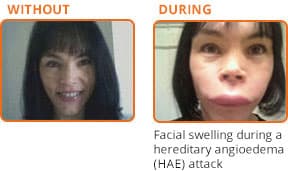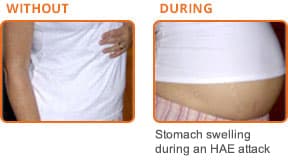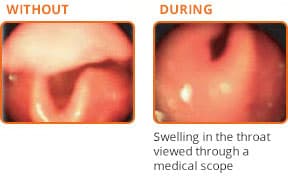HAE symptoms
Recognizing the symptoms of an HAE attack
Hereditary angioedema (HAE) can cause attacks of swelling in any part of the body, but the most common locations include the skin (eg, face, hands, feet, genitals), stomach, and throat. Before an attack, some people with HAE experience early warning signs, also called prodromal symptoms, such as tingling, rash, fatigue, or nausea.
Skin, or cutaneous

- Swelling of the skin usually affects the hands, feet, face, or genitals
- Can be temporarily disfiguring and disabling and get in the way of everyday activities
- May be accompanied by redness, but the area usually doesn’t itch
Photos courtesy of US Hereditary Angioedema Association. www.haeimages.com.
Stomach, or abdomen

- Stomach attacks are the most commonly reported symptoma
- Can cause mild to severe pain
- May be accompanied by vomiting and/or diarrhea
- Some people experiencing untreated stomach (abdomen) attacks had to stay in bed between 24 and 50 hoursa
- Stomach attacks may be confused with other diagnosis leading to unnecessary surgeries. 19-24 % of people reported undergoing unnecessary surgeries as a result of misdiagnosed stomach attacksb
aIn a survey of 23 people.
bIn a 2010 online survey of 313 people.
Photos courtesy of US Hereditary Angioedema Association. www.haeimages.com.
Throat, or larynx

- Causes swelling in the throat, also called a laryngeal attack
- Swelling in the throat can interfere with breathing, creating a potentially life-threatening situation
- May cause other symptoms, such as voice changes and difficulty swallowing
Photos courtesy of Bas M, et al. Allergy. 2006;61(12):1490-1492.


